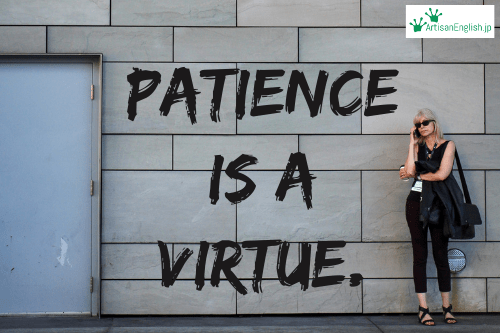
YouTube / iTunes / Spotify / Radio Public / Pocket Casts / Google Podcasts / Breaker / Overcast
Listen to ArtisanEnglish.jp posts & lesson intros here.
Saying: Patience is a virtue
On March 11, 2020, slightly more than six months ago, the WHO declared COVID-19 a pandemic.
Many things have changed since then, and many things that were planned to happen never happened.
What better time to learn the meaning of the expression patience is a virtue than the present?
So, more than likely, you know that patience is the ability to wait for something to happen without becoming annoyed.
Among English language students, ‘virtue’ is probably less well-known.
Well, a virtue is a good moral quality to have.
If we put them together, we get the very well-known saying patience is a virtue, which means the ability to wait for something without becoming angry or annoyed is a good quality for a human to have.
This novel coronavirus pandemic is testing each of us in some way.
Some of us are being patient and taking the shutdowns, lockdowns and slowdowns in stride.
Unfortunately, most of us are not.
Western societies have become used to getting what we want when we want it.
We’ve turned into bigger, better, faster, more give-it-to-me-now cultures, unaccustomed to waiting for anything and seldom embody the qualities behind the saying ‘patience is a virtue.’
Things will get better, we will beat this virus, but we will not be victorious tomorrow, next month or even next year.
Things have changed, reality has changed, and there is no going back until we have a surefire vaccine for this virus.
Until then, we all have to be patient because patience is a virtue, and that’s what we need right now.
Flesch-Kincaid Readability Test
This post is understandable by someone with at least an 8th-grade education (age 13 – 14).
On the Flesch-Kincaid reading-ease test, this post scores 66.
The easier a passage is to read, the higher the score on a scale of 0 – 100.

